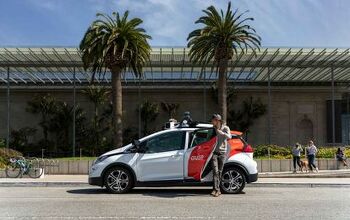And Now: Grid Anxiety

Imagine: It’s Friday evening, and the sun is down. You are rolling home in your environmentally responsible EV after an honest day’s work, emitting exactly zero greenhouse gases. You give a wave to your likewise electrified neighbor who’s bringing home the bacon to wife and family. You put the car in the garage and hook it up to the charger that nice electrician had installed. You shout “daddy’s home!” Suddenly, all hell breaks loose.
A huge fireball shoots into the sky as the transformer on the pole out on the street explodes. Down at the corner, another explosion. A block down, a substation throws angry arcs into the night, then goes up in flames.
Suddenly, it is pitch dark and dead silent. Minutes later, the silence is pierced by the sound of sirens …
This is the nightmare scenario that flashes through the heads and across the spreadsheets of managers at the nation’s electric utilities. While some of them already draw hockey stick graphs and count the money they will make from all those electric cars that will hit the road soon, others are very, very worried.
“Electric vehicles have the potential to completely transform our business,” says David Owens, executive vice president of the Edison Electric Institute, a trade group. He’s right. It could blow it up.
Not since air conditioning spread across the country was the power industry faced with such a potential surge in consumption. We all know what can happen on a hot evening when everybody comes home and turns on the A/C. This is nothing compared to what that Nissan Leaf or Chevy Volt can do to the circuitry.
“Plugged into a socket, an electric car can draw as much power as a small house. The surge in demand could knock out power to a home or a neighborhood,” explains Associated Press, here via The Toledo Blade.
The drivers of any market are fear and greed. So much for the fear.
Now for the greed part: Last year, Americans spent $325 billion on gasoline. Your friendly utility company would like to have a slice of that monster pie.
So as you are reading this, power companies are scratching their heads and are sifting through what little data there is to divine where the first pockets of EVs are most likely to appear. That’s where they will put in beefier equipment.
Utilities think they have enough plants and equipment to power hundreds of thousands of electric cars. The problem is in the grid. And in a phenomenon long known as keeping up with the Joneses, or what car makers and utilities now call “clustering.”
Thick pockets of EVs could suddenly crop up where
- Generous subsidies are offered by states and localities
- The weather is mild, batteries perform better in warmer climes, but A/C cuts down on range in really hot ones
- High-income and environmentally conscious commuters live
And if your electric company doesn’t do something now, this is where the transformers will go kaboom.
California cities including Santa Monica, Santa Barbara, and Monrovia could suddenly have several vehicles on a block.
Down South, Progress Energy Inc. plans for clusters in Raleigh, Cary, and Asheville, N.C., and around Orlando and Tampa, Fla.
Duke Energy is expecting the same in Charlotte and Indianapolis. The entire territory of Texas’ Austin Energy is expected to be an electric-vehicle hot spot.
But look at the bright side: “Sorry, can’t come to work today. We had rolling brownouts all night, and my charger was taken off the grid remotely. Better luck tomorrow, boss!”
The absolutely most nightmarish scenario? Nobody buys the EVs and the hefty equipment has been put in for nothing. You’ll read it in your electric bill, one way or the other.

Bertel Schmitt comes back to journalism after taking a 35 year break in advertising and marketing. He ran and owned advertising agencies in Duesseldorf, Germany, and New York City. Volkswagen A.G. was Bertel's most important corporate account. Schmitt's advertising and marketing career touched many corners of the industry with a special focus on automotive products and services. Since 2004, he lives in Japan and China with his wife <a href="http://www.tomokoandbertel.com"> Tomoko </a>. Bertel Schmitt is a founding board member of the <a href="http://www.offshoresuperseries.com"> Offshore Super Series </a>, an American offshore powerboat racing organization. He is co-owner of the racing team Typhoon.
More by Bertel Schmitt
Latest Car Reviews
Read moreLatest Product Reviews
Read moreRecent Comments
- Corey Lewis Facing rearwards and typing while in motion. I'll be sick in 4 minutes or less.
- Ajla It's a tricky situation. If public charging is ubiquitous and reliable then range doesn't matter nearly as much. However they likely don't need to be as numerous as fuel pumps because of the home/work charging ability. But then there still might need to be "surge supply" of public chargers for things like holidays. Then there's the idea of chargers with towing accessibility. A lack of visible charging infrastructure might slow the adoption of EVs as well. Having an EV with a 600+ mile range would fix a lot of the above but that option doesn't seem to be economically feasible.
- 28-Cars-Later I'm getting a Knight Rider vibe... or is it more Knightboat?
- 28-Cars-Later "the person would likely be involved in taking the Corvette to the next level with full electrification."Chevrolet sold 37,224 C8s in 2023 starting at $65,895 in North America (no word on other regions) while Porsche sold 40,629 Taycans worldwide starting at $99,400. I imagine per unit Porsche/VAG profit at $100K+ but was far as R&D payback and other sunk costs I cannot say. I remember reading the new C8 platform was designed for hybrids (or something to that effect) so I expect Chevrolet to experiment with different model types but I don't expect Corvette to become the Taycan. If that is the expectation, I think it will ride off into the sunset because GM is that incompetent/impotent. Additional: In ten years outside of wrecks I expect a majority of C8s to still be running and economically roadworthy, I do not expect that of Taycans.
- Tassos Jong-iL Not all martyrs see divinity, but at least you tried.

































Comments
Join the conversation
I am sure that the "horse stable owners association" had equally dismal predictions regarding the horseless carriage and the uncontrolled introduction of gasoline into America's communities back in 1895 or so.
I've seen exploding transformers and burning utility poles, kinda pretty.... and scary when all goes dark and quiet.